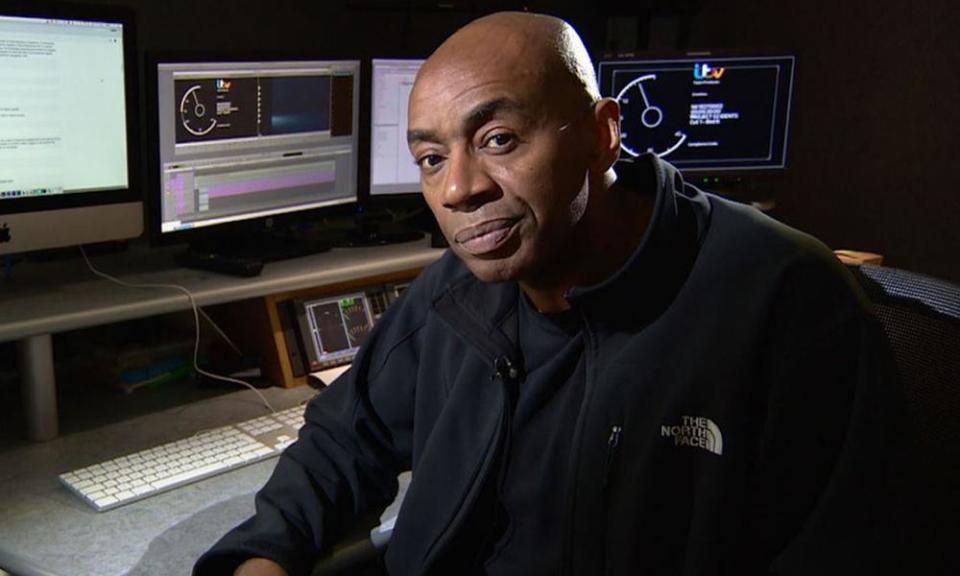Tributes paid to 'role model' ITV Granada presenter Tony Morris

Thousands of people have paid tribute to a TV presenter who was a “massive inspiration” to aspiring black journalists and considered a friend by millions of viewers across north-west England.
Tony Morris, who presented Granada Reports on ITV for 17 years, died last week of kidney cancer. He was 57.
Known for his cheeky asides and huge laugh, Morris – known to his colleagues as Mozzer – asked powerful people the no-nonsense questions that viewers were shouting at the telly at home.
“When the then prime minister David Cameron came on the programme to defend tax changes that would hit the poorest workers hardest, Morris said: “You can afford to do that – you’re minted.”. He also took Tony Blair to task over the exorbitant cost of childcare.
A book of condolence set up by ITV has been signed by more than 2,500 people. Bury hospice, which looked after Morris in his final weeks, has received £12,700 in donations since his death on 1 August, as well as cards from around the country.
Colleagues recalled his ability to connect with people who struggled, having grown up in care and joined the RAF aged 16. He was in his late 20s and had two young daughters when he became a BBC radio trainee in 1992, having worked as a DJ and sold insurance after leaving the armed forces.
Born to Jamaican parents, he had been fostered by a white woman called Audrey, who looked after him until adulthood on a Portsmouth council estate.
Lucy Meacock, a Granada presenter for 32 years, said Morris formed an immediate connection with the audience when he joined her in 2003. “He had it tough growing up, and because of that he always had a kindness and an understanding of those who had it tough too,” she said.
He never feared speaking truth to power, she recalled. “He had a great art for asking the direct question, everything that viewers at home were thinking when they heard someone powerful say something and thought: come off it.”
She remembered Morris refusing to go to an awards ceremony early in his ITV career, saying: “The only other black people there will be waiting on tables.” Within years he was winning Baftas, and in February this year – two months after being diagnosed with cancer – he was shortlisted for the Royal Television Society awards in the nations and regions presenter of the year category.
Morris’s eldest daughter, Natalie, now a journalist at Metro UK, said he never viewed himself as a role model. “It’s undeniable that he was a role model, but that was incidental for him,” she said.
“I know now how difficult it can be being the only non-white face in newsroom meetings but he was doing it 20 years ago. It can’t have been easy but it’s a testament to his talent and his resilience how he broke down these barriers and paved the path for a new generation.”
Granada Reports had a better track record than many media organisations of promoting black and minority ethnic talent even before Morris’s arrival, with Juliet Alexander and Sohail Rahman appearing regularly on screen.
But in becoming a teatime TV institution, Morris became a hero to the black communities of the north-west, said his colleague Jahmal Williams-Thomas, a Granada camera operator turned reporter who grew up in Manchester’s Moss Side.
“Watching Tony on TV when I was younger, it felt like he was one of the family. My nan is Jamaican and she absolutely loved him – apart from Trevor McDonald he was one of the few black faces reading the news at the time,” he said. “Tony was a massive inspiration to me and the black community. Whenever we do stories now in places like Moss Side, people always ask: ‘Wow, do you know Tony Morris, that big guy off the telly?’”
Sometimes black communities think mainstream news is not for them, said Williams-Thomas. “I got a bit of that when I started out in journalism. ‘It’s a bit of a white thing, that’ … Having people like Tony was massive for us. A person that showed us if he can do it, then so can I.”

 Yahoo News
Yahoo News 